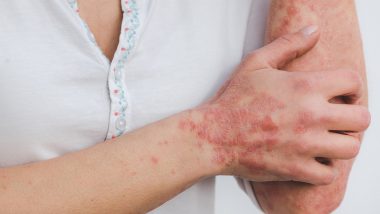Psoriasis is a very common skin disease that causes red and itchy patches. These rashes can form anywhere on the body. These patches are covered in scales and tend to have a silvery-white, brown or purplish appearance, depending on the skin tone. The most common areas that get affected are the elbows, knees, scalp, nails, and face. Unlike some other skin conditions, psoriasis is not contagious. Psoriasis is an autoimmune disease. This means that the body's immune system mistakenly attacks healthy skin cells, causing them to grow quickly. This is what creates rashes. There is no specific cure for psoriasis, but it can be treated. The rashes tend to flare up for weeks or months and then clear up for some time. Psoriasis can be uncomfortable to live with. It can also affect your sleep or concentration. But if proper care is taken, it can be managed, and one can live a normal life. World Psoriasis Day: From Gluten to Alcohol, Food and Drinks That Can Trigger the Disease
Psoriasis Causes
The exact causes for Psoriasis are not clear but years of research point to genes and immune system. Psoriasis is an autoimmune disease. This means the body's defence system, that is normally on guard against bacteria, mistakenly attacks healthy skin cells. In healthy skin, the cells grow deep down and slowly rise to the surface. This cycle usually lasts about a month. In psoriasis, however, immune system cells also known as T cells, attack healthy skin cells. They cause this process to speed up. New skin cells develop very fast and pile up on the surface. This results in the thick, red patches we see with psoriasis. Certain things can trigger flare-ups of psoriasis. These include stress, certain medications, infections like strep throat, skin injuries and even cold weather.
Psoriasis Symptoms
A patchy rash is a common symptom. Affected areas tend to become very dry. The skin may even crack and, in some instances, bleed. Itching, soreness and a burning sensation are also common symptoms.
Psoriasis Treatment
Psoriasis is not a one-size-fits-all condition. Since there are different types of psoriasis, the treatment for a person will depend on the type of psoriasis, how severe the symptoms are and which part of the body has been affected. Topical treatments like creams and ointments, including steroids, are used to reduce inflammation. In addition, specific moisturisers will be recommended for dry skin, along with medications to slow skin cell growth. If these don't help, light therapy, retinoids or even immunotherapy to target the overactive immune system could be recommended. Celebrities With Chronic Illness: From Selena Gomez With Lupus to Kim Kardashian's Battle With Psoriasis, Here's a List of Stars With Health Conditions.
Psoriasis is not always active. Think of the skin condition as having a switch on and switch off button. The condition may just flare-up all of a sudden and then not appear for a while. These flare-ups can last for up to weeks or even months. It is important to follow the treatment and medication recommended by the healthcare provider. Also, avoiding triggers can help keep psoriasis under control.
(This article is written for an informative purpose and should not be substituted for medical advice. Kindly consult your doctor before trying any tips.)
(The above story first appeared on LatestLY on Jul 18, 2024 03:45 PM IST. For more news and updates on politics, world, sports, entertainment and lifestyle, log on to our website latestly.com).













 Quickly
Quickly


